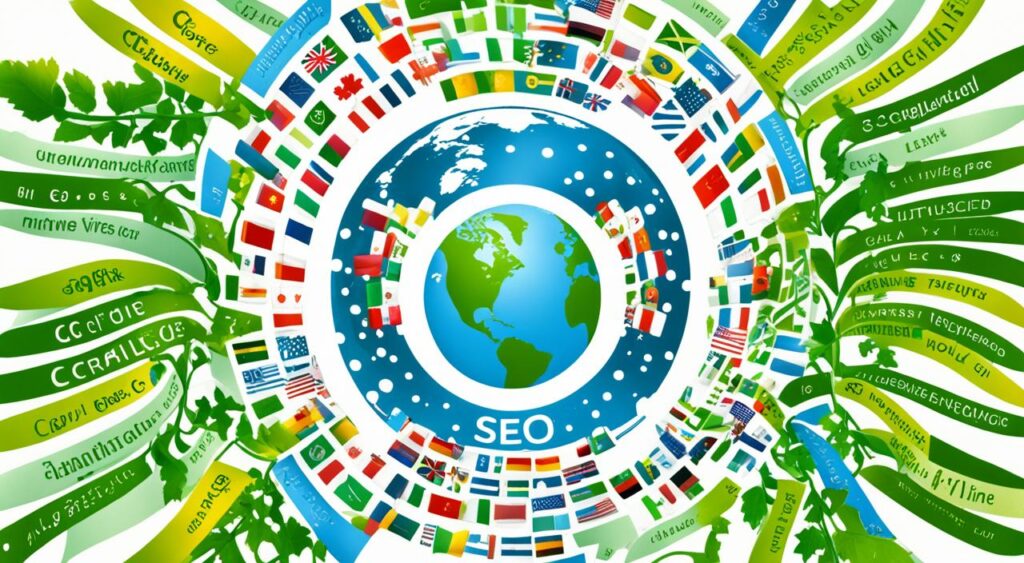In a world where the whisper of globalization has become a resounding call, your business’s story is no longer confined to the pages of a local newspaper. Picture this: a small, vibrant brand buzzing with potential as it crafts unique offerings for its local clientele. Then, as the digital dawn breaks, it turns its gaze beyond the misty horizons, seeking growth amidst a myriad of cultures, languages, and search engines. Here lies the quintessence of International SEO, an orchestrated blend of global SEO techniques and international digital marketing. It’s the art of optimizing your digital presence so the click of a customer thousands of miles away is as intentional and destined as if they were right next door.
You might wonder how a brand hops from the local stage to the global arena. It all begins with embracing the finesse of International SEO, understanding the intricate dance of algorithms on a world stage, and speaking in tongues – digitally – to resonate with the hearts and search queries of consumers worldwide. Your success is no accident; itâs engineered through the strategic globalization of your online presence, which beckons to international customers in their own cultural contexts.
Key Takeaways
- International SEO is critical to tapping into new and diverse markets across the globe.
- Global SEO techniques bridge the gap between local brilliance and international presence.
- Understanding cultural nuances is as crucial as algorithmic knowledge in international digital marketing.
- The heart of effective globalization lies in communication that is culturally and linguistically tailored.
- Your global reach depends on a harmonious blend of technical expertise and creative adaptation.
- International SEO is the journey from local success to becoming a worldwide staple.
Understanding International SEO and Its Importance
The digital landscape transcends borders, connecting customers and businesses around the globe with the click of a button. In this connected world, global search engine optimization (SEO) is a critical step for businesses targeting international markets. Grasping the concept and the importance of International SEO is not just about broadening your market reachâit’s about mastering the art of presenting your brand to a diverse array of cultures and languages.
Defining International SEO and Its Scope
International SEO is the process of optimizing your website so that search engines can easily identify which countries you want to target and which languages you use for business. This includes optimizing your site for different languages and country-specific search engine results pages (SERPs). A comprehensive strategy for SEO for multiple countries involves technical elements like hreflang tags, as well as culturally nuanced content to engage international audiences effectively.

Why Your Business Needs to Think Globally
Your business needs to adopt a global mindset as it allows you to expand beyond saturated local markets and tap into international demand. The growth potential in new markets can be exponential, but it requires an adept understanding of targeting international markets. Implementing robust International SEO strategies can propel your website to the forefront of global SERPs, boosting visibility among foreign prospects.
The Impact of Cultural Differences on SEO
Cultural nuances influence how different regions use search engines. For example, keyword popularity can vary significantly from one country to another due to language dialects and cultural preferences. Customizing content to resonate with local audiences is paramount, making the role of cultural differences a central aspect to consider in your global search engine optimization strategy.
| SEO Component | Local Market Consideration | International Market Consideration |
|---|---|---|
| Keywords Research | Focused on region-specific terminology and slang. | Utilizes language and cultural nuances to target a broader audience. |
| User Experience (UX) | Adapted to local browsing habits and website interactions. | Designed to cater to varied international preferences and behaviors. |
| Content Creation | Targets local cultural trends and news. | Incorporates a wider understanding of global events and cultural diversity. |
| Link Building | Seeks local industry influencers and platforms. | Expands to include international authority sites and cross-border partnerships. |
Developing a Multilingual SEO Approach
As you venture into optimizing your website for global audiences, it’s essential to develop a multilingual SEO approach that not only translates words but conveys the cultural nuances behind them. This strategy is fundamental to SEO for multiple countries, where search behaviors and language use may vary dramatically.

Launching into international keyword research is not merely about finding direct translations of your existing keywords. It involves a deep understanding of local search terms and the intent behind them. Engaging in this level of research sets the groundwork for SEO content that truly resonates with your international audience.
- Identify the primary languages of your target markets.
- Conduct keyword research based on regional search behaviors.
- Create culturally relevant content that aligns with local preferences.
Strengthening your site’s global appeal goes beyond words on a page; it’s about forming a connection with the user in their mother tongue. When you put the effort into fine-tuning your multilingual SEO tactics, your engagement rates can see a significant uplift.
| Language | Localized Keyword | Search Volume | Cultural Relevance |
|---|---|---|---|
| Spanish | Seguros de Vida | 18,000/month | Highly relevant; insurance is a culturally significant topic in Spanish-speaking countries. |
| French | Assurance Vie | 22,000/month | Commonly discussed in French media; reflective of local consumer behavior. |
| German | Lebensversicherung | 27,000/month | Has a semantic connection with financial security, a priority in German society. |
In conclusion, multilingual SEO is more than a technical adjustment; it’s a strategic move towards creating an inclusive, inviting online space for audiences around the globe. Invest in comprehensive international keyword research, localize your content, and watch as your global presence expands.
International SEO
As your business steps onto the global stage, it becomes crucial to develop a website framework that’s attuned to the diversity of international markets. While fundamental concepts of SEO remain as your foundation, global SEO strategies demand nuanced modifications tailored toward international digital marketing. At the core, global search engine optimization not only serves as a connector to various cultures but also a beacon for international brand presence.
Structuring Your Website for International Audiences
Structuring your website to accommodate international visitors starts with an in-depth understanding of your audience’s needs. Efficient global SEO strategies involve creating a user experience that feels both familiar and intuitive to users, irrespective of their geographic location. It means optimizing your site’s architecture to support multiple languages, embracing cultural nuances, and ensuring that regional variations are respected and reflected in your content.
Selecting the Right Domain Strategy for Global SEO
Choosing a domain strategy is one of the most decisive steps in framing your global SEO landscape. Whether you opt for a country-code top-level domain (ccTLD), a subdomain, or a subdirectory strategy depends on various factors. Considerations include brand recognition, search engine implications, legal requirements, and overall cost-effectiveness. Your decision should enhance your global SEO strategies and reinforce your international digital marketing efforts.
How to Handle URL Parameters and Language Tags
URL parameters and language tags play a significant role in conveying content relevancy and language targeting to search engines. Proper utilization of hreflang tags ensures that the right regional or language-specific version of your website is presented to users. It’s not only about telling Google what language your page is in; it’s about preventing duplicate content issues and providing a seamless browsing experience to your global audience.
While technological intricacies are crucial, it’s the strategic foresight within international digital marketing that ultimately determines success in global search engine optimization. With the right approach, you can create an online space where international visitors don’t just arrive but engage and convert, fostering a truly global brand.
Executing Global SEO Strategies
Embarking on the journey of global SEO techniques is much like setting sail in uncharted waters â it requires both a skilled navigator and a well-equipped vessel. Your expertise in international keyword research and comprehensive understanding of targeting international markets serve as the compass and map to guide your brand to global success. In this crucial phase of execution, integrating these strategies into your online presence is pivotal.
Content localization goes beyond mere translation. It requires a nuanced appreciation of regional dialects, customs, and search habits. A content piece tailored for the United States audience might miss the mark in Brazil, despite the language similarities. Hence, incorporating specific cultural elements and idioms that resonate with each locale is a must.
The acquisition of links from reputable international sources is not just a vote of confidence in the eyes of search engines, but also a bridge connecting your content to diverse markets. These inbound links, from various regional domains, enhance the global credibility and relevance of your website.
Moreover, the astute use of social signals from different regions can bolster your brandâs international stature. A tweet shared in Madrid, a Facebook post liked in Jakarta, or an Instagram story viewed in Dubai, each social interaction amplifies your presence within these communities, directly affecting your siteâs visibility in local searches.
| SEO Activity | Benefits | Best Practices |
|---|---|---|
| International Keyword Research | Drives targeted traffic from diverse regions | Use tools that analyze search trends per country |
| Content Localization | Increases engagement with culturally relevant content | Employ native speakers for authentic content creation |
| Link Acquisition | Enhances domain authority on a global scale | Build relationships with international partners |
| Social Signals | Improves organic search performance through social engagement | Understand peak social media usage times in different time zones |
Each aspect of your global SEO campaign is a cog in a larger machine. To ensure the entire mechanism operates smoothly, you must evaluate and iterate upon your tactics frequently. Following these recommendations will position your brand favorably across the vast expanse of the international digital landscape.
Conclusion
Throughout this insightful exploration of International SEO, you’ve been equipped with the actionable knowledge to extend your brand’s digital footprint across the globe. With a clear understanding of global SEO strategies, your march towards international market success is well underway. Yet, this is just the beginning. The dynamism of global search engine optimization requires a commitment to growth and responsiveness to the ever-evolving digital landscape.
Key Takeaways for Success in International Markets
A successful foray into international markets hinges on tailoring your approach to suit diverse audiences, respecting cultural nuances, and implementing robust global SEO strategies. Mastery of multilingual SEO, domain strategies, and understanding the subtleties of cultural differences will elevate your brand, positioning it as a globally recognized entity. Remember, adaptability is the bedrock of your international digital marketing ventures.
Continual Learning and Adaptation in International SEO
As you navigate the complexities of International SEO, always prioritize continuous learning and remain agile to maintain a competitive advantage. The world of global search engine optimization never stands still, and neither should you. By constantly refining your strategies and techniques, you ensure sustainable growth and an enduring global presence. The road ahead is rich with opportunity â embrace it with the dynamic, ever-evolving spirit of International SEO at your core.
FAQ
What is International SEO and why is it important?
International SEO is the process of optimizing your website to target audiences in multiple countries and languages. It’s important because it helps businesses to reach a global audience effectively, considering cultural differences, local search behaviors, and language-specific nuances.
How does global SEO differ from local SEO?
Global SEO focuses on reaching international markets and typically requires a multilingual approach to content, while local SEO concentrates on optimizing for local search queries and is specific to a particular geographic area or community.
Can you explain the impact of cultural differences on SEO?
Cultural differences can greatly influence search behaviors and interactions with online content. Aspects like language, customs, and user intent vary from region to region, which means keywords, content relevance, and user experience must be tailored for different cultures.
Why should businesses think globally with their SEO strategy?
Thinking globally allows businesses to expand their reach, tap into new markets, and leverage opportunities in the international marketplace. A global SEO strategy can lead to increased brand visibility, a diversified customer base, and higher engagement levels across different regions.
What are the strategies for developing a multilingual SEO approach?
Developing a multilingual SEO approach involves translating and localizing content, conducting international keyword research, understanding regional search engine variations, and ensuring that technical SEO aspects like hreflang tags are correctly implemented for language targeting.
How should a website be structured to cater to international audiences?
A website should be structured with a clear international targeting in mind, which could involve using a separate domain or subdomain for each country, employing language-specific directories, or utilizing language parameters. Providing clear language and country options for users also helps ensure a positive user experience.
What is the right domain strategy for International SEO?
The right domain strategy depends on various factors including business goals, brand considerations, and the targeted countries. Options include using country code top-level domains (ccTLDs), subdomains, or subdirectories with generic top-level domains (gTLDs), each with their own SEO implications.
How should URL parameters and language tags be handled for International SEO?
URL parameters should ideally be minimized for better SEO, but when necessary for language selection, they must be clearly defined and consistent. Language tags, such as hreflang annotations, should be correctly used to inform search engines about the language and regional targeting of your content.
How can I execute effective global SEO strategies?
You can execute effective global SEO strategies by incorporating international keyword research into content creation, understanding and implementing technical SEO best practices for multilingual sites, acquiring links from relevant international sources, and considering the social signals from targeted markets.
What type of continual learning and adaptation is required for successful International SEO?
Successful International SEO requires staying updated with international search engine algorithms, understanding evolving user behavior across different regions, routinely analyzing and refining your global SEO tactics, and staying informed about global digital marketing trends to adapt strategies accordingly.











